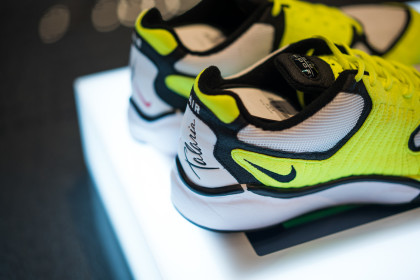
Looking back at our mistakes
For the past few years, thanks to advances in technology, art conservationists have been going through their archives and shedding new light on historical works of art. By using infrared imaging and testing for certain types of isotopes, they’ve discovered that many of our most-talked-about paintings have been re-worked several times. Most recently, French scientists have uncovered the supposed first draft of the Mona Lisa, hidden underneath the current painting. They now claim its discovery will completely “alter our vision of Leonardo’s masterpiece forever.”
Making several drafts of a piece of art before having an end result you’re happy with sounds like an obvious process. Everyone makes first drafts and everyone makes errors. But because we usually view art in a very two-dimensional sense, it’s easy to forget the amount of work that went into them. Art has layers, both physically and metaphorically that have to be taken into account. Remember that our idols make mistakes too, and they had to go through similar self-editing trials and techniques to finalize their work. Our mistakes can still have value.
This brings up the question of how we choose to examine our past. Is it beneficial for us to be re-examining so much, hoping to gain new insights and answers to life? Will we ever stop looking back? Are we still so lost?
Let’s even take a look at a different example. There is a case of a monk from the 13th century who wrote over one of Archimedes Greek manuscripts from the 10th century. That manuscript depicted scientific advancements and thoughts that weren’t realized again until Isaac Newton in the 17th century. Would society be more advance had that information not been written over? Well, in the case of the monk, probably not. The scientific community had already overlooked that work for centuries before it was repurposed with a Christian religious text. (This isn’t the first time scientific discoveries have been lost either- remember the Library of Alexandria?)
So, will the new version of the Mona Lisa change history? Again, it probably won’t be talked about to the same extent as before because her strong legacy about her anonymity- but highlighting that the process these artists go through seems to be what’s important to take away.
We are afterall all students in the same school of life. If we can’t learn from the past, at least we can recognize that they hadn’t perfected everything either. All we can do is continue to examine, continue to question, continue to create, and continue to move forward.
For the past few years, thanks to advances in technology, art conservationists have been going through their archives and shedding new light on historical works of art. By using infrared imaging and testing for certain types of isotopes, they’ve discovered that many of our most-talked-about paintings have been re-worked several times. Most recently, French scientists have uncovered the supposed first draft of the Mona Lisa, hidden underneath the current painting. They now claim its discovery will completely “alter our vision of Leonardo's masterpiece forever.”
Making several drafts of a piece of art before having an end result you’re happy with sounds like an obvious process. Everyone makes first drafts and everyone makes errors. But because we usually view art in a very two-dimensional sense, it’s easy to forget the amount of work that went into them. Art has layers, both physically and metaphorically that have to be taken into account. Remember that our idols make mistakes too, and they had to go through similar self-editing trials and techniques to finalize their work. Our mistakes can still have value.
This brings up the question of how we choose to examine our past. Is it beneficial for us to be re-examining so much, hoping to gain new insights and answers to life? Will we ever stop looking back? Are we still so lost?
Let’s even take a look at a different example. There is a case of a monk from the 13th century who wrote over one of Archimedes Greek manuscripts from the 10th century. That manuscript depicted scientific advancements and thoughts that weren’t realized again until Isaac Newton in the 17th century. Would society be more advance had that information not been written over? Well, in the case of the monk, probably not. The scientific community had already overlooked that work for centuries before it was repurposed with a Christian religious text. (This isn’t the first time scientific discoveries have been lost either- remember the Library of Alexandria?)
So, will the new version of the Mona Lisa change history? Again, it probably won’t be talked about to the same extent as before because her strong legacy about her anonymity- but highlighting that the process these artists go through seems to be what's important to take away.
We are afterall all students in the same school of life. If we can’t learn from the past, at least we can recognize that they hadn’t perfected everything either. All we can do is continue to examine, continue to question, continue to create, and continue to move forward.




